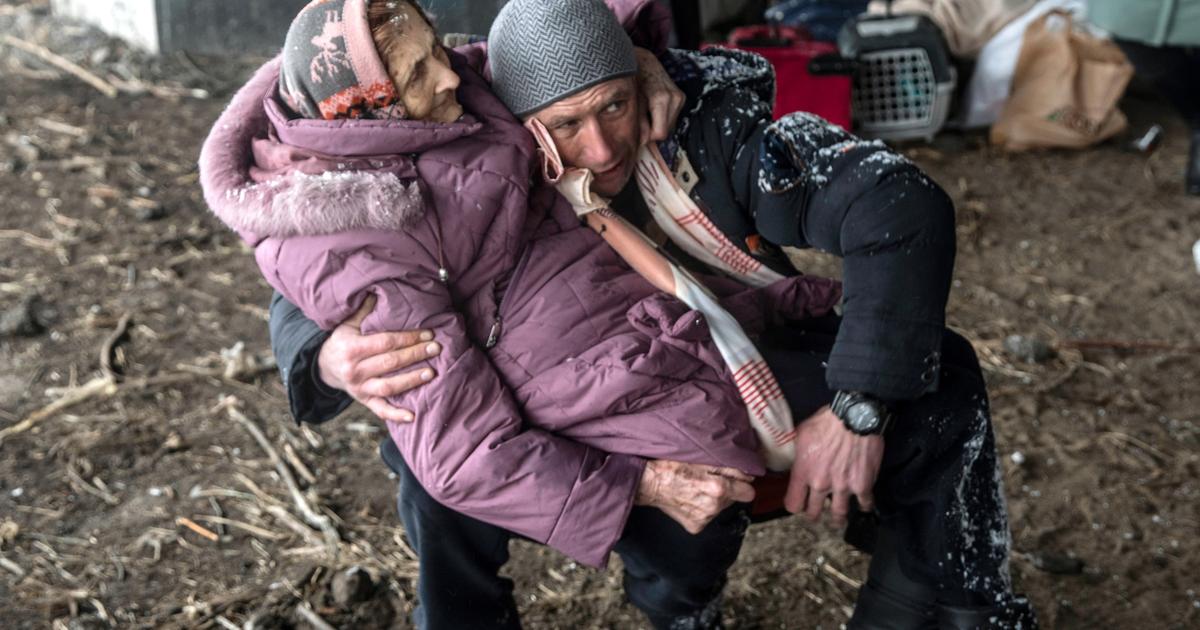Sent to Ukraine by
The Washington Post,
American photojournalist Heidi Levine arrived in Kiev on February 20, four days before the start of the Russian invasion.
His photographs are published every day, they are frontal, close to people, sometimes very harsh, on the faces you can read distress and determination.
In the Anglo-Saxon jargon of war reporters, Heidi Levine is said to be a
war veteran
: winner of numerous distinctions, including a double Bayeux prize for war correspondents (jury and public) in 2015, she started her career in 1983 in Israel, took short breaks for the birth of her three children, and has since covered more thirty years of conflicts all over the world, in Gaza, in Syria, in Iraq.
Yet she says this war is unlike anything she's seen before.
She spoke to us on the phone from Kyiv.
In video, a Ukrainian couple gets married on the defense line in kyiv
Madame Figaro
.– You say that the violence of the conflict in Ukraine goes beyond anything you have covered so far…
Heidi Levine.–
It is not a hierarchy in horror: obviously, what people have suffered in Gaza, in Syria, in Iraq, is no less horrible.
But what is happening in Ukraine, in 2022, on the European continent, it is as if we had learned nothing from the past, that history had been useless.
This war is different because it is haunted by the risk of global escalation and the nuclear threat.
Everyone thinks about it here, all the time.
It is also the most massive exodus since the Second World War in a country which has 44 million inhabitants.
Sometimes, in spite of myself, I have these superimposed images of this Second World War, these black and white photos of people who, like here, live in basements, without water, without electricity, without anything to eat,
Full screen
Sniper Daria in her damaged apartment in kyiv on March 15.
Heidi Levine
The Washington Post
offered to take a break, go home, and you said no.
Why ?
I became a photographer because I wanted a job that would allow me to be useful.
If I am, it's here, now.
Making images to bear witness to a reality, especially when propaganda denies this reality.
The longer you stay in one place, the more useful you are: you can go deep, start getting to know Ukrainian culture, understand things you didn't understand at first.
I only regret that travel is more and more complicated for journalists.
The Ukrainian forces block our access, prevent us from going to see.
No doubt there are things they don't want us to see.
The fear that their positions will be exposed.
They also want to prevent the deaths of other journalists.
You have done many subjects on Ukrainian women, in maternity, in the army, and reports where we see death up close. What impact does what you photograph have on you?
It would be wrong to think that our camera protects us.
Whether it's me or the other journalists.
I have nightmares, I wake up at three in the morning.
All journalists are emotionally involved.
How not to be ?
All the attacks we see are against civilians.
And these civilians hug us, thank us for being there, for telling their story to the rest of the world.
I couldn't tell you how many people have hugged me all the time.
So yes, I cry with them, I put the device down when I see that I can help someone carry something, cross a bridge.
There are many situations where helping people, or even just listening to them, is more important than taking pictures of them.
There are many situations where helping people, or even just listening to them, is more important than taking their picture.
Heidi Levine
How do you envision the coming days?
We journalists were very worried when we arrived.
And then we were incredibly impressed by the energy of the Ukrainians, their resilience, their determination.
There is not a person I have met who is not 100% committed to fighting for his country, whether in the army, helping with supplies, evacuating the wounded... So , we are especially worried about what we do not see.
We hear about mass graves in Mariupol, with hundreds of bodies, kidnappings, forced population transfers to Russia.
But no more journalists are there to testify.
Your family, your children are not too worried about you?
Yes, very much.
My mother, who has been used to seeing me do my job for thirty years and has always encouraged me, this time called me in tears, repeating: "Leave Ukraine, please, come back!"
But it was my son who reacted the worst, he is very angry.
When I send a message to say that I'm fine, that I'm staying in a hotel where the people are adorable, where I have enough to eat, he replies with a news link on the articles that talk about death of journalists.
However, we have lived since their birth in a country at war, Israel, and they grew up always knowing what I was doing and what was happening where I was.
For me, on a purely personal level, being here is less difficult than what I did when they were little, it
that is, spend my day in Gaza, cover a suicide bombing, and then come home and cook them dinner.
For them, on the other hand, the fact of being adults now gives them a different awareness of things.

